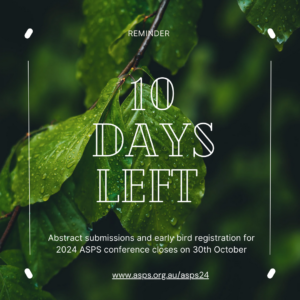Welcome to the October 2024 edition of Phytogen!
Early registration and abstract submissions for the ASPS conference closes on 30th October. Register and submit an abstract for your local ASPS hybrid conference HERE
This issue we highlight A/Prof Jenny Mortimer, recipient of the 2024 Jan Anderson Award. We also have a contribution from Dr. Nipuni Peththa Thanthrige, our Genetics & Molecular Biology Representative, student contribution from Ben Wee, a final year PhD student in ARC Medicinal Agriculture Hub at La Trobe University, and we round up with the final cohort of student awardees of the travel grant of the International Plant and Molecular Biology (IPMB) conference held in Cairns in June.
Expression of Interest are still open to be part of ASPS as council members and discipline reps.
We welcome contributions from students and researcher at any time for publication in Phytogen. Its free and a great way to give your research profile a boost and share your findings! Send your contribution to our editors Razlin (razlin.azman@csiro.au) or Lucas (L.Auroux@latrobe.edu.au).
2024 ASPS Award Winner Spotlight: Jan Anderson Award
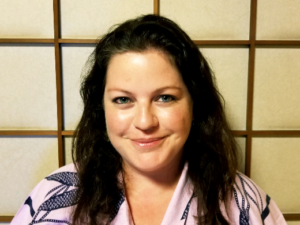 A/Prof Jenny Mortimer
A/Prof Jenny Mortimer
University of Adelaide
Academic profile : UoA profile
Lab webpage: mortimerlab.org/.
Social media (Twitter) Jenny_Mortimer1
Google Scholar Jenny Mortimer – Google Scholar
The editorial team congratulates Jenny Mortimer on her Jan Anderson Award. Jenny is an Associate Professor of Plant Synthetic Biology in the School of Agriculture, Food and Wine at the University of Adelaide (UoA), Australia, where she is also Deputy Director (Interim) of the Waite Research Institute. She is Chief Investigator (CI) and UoA node leader of the ARC Centre of Excellence Plants for Space (P4S). She is also an Affiliate Staff Scientist at Lawrence Berkeley National Laboratory, USA, and a Director of Plant Systems Biology at the Joint BioEnergy Institute, USA. After completing her PhD at Cambridge University, UK, she began exploring how engineering the plant cell wall could deliver sustainable and economically viable biofuels: first as a postdoc in Cambridge, then as a research fellow at RIKEN Japan, before joining Berkeley Lab in 2014, and Adelaide in 2021. Her team’s research focuses on understanding and manipulating plant cell metabolism, with a focus on complex glycosylation. The goal is to develop knowledge and crops which contribute to a sustainable and renewable bioeconomy.
At Adelaide, her group is using synthetic biology to develop new crops for food and materials production in controlled growth environments – including for Space settlement (P4S), applying new agricultural biotechnologies to develop resilient field crops as a CI in the ARC Training Centre for Future Crops Development, and developing Australian feedstocks for sustainable jet fuel as a CI in the ARC Research Hub for Engineering Plants to Replace Fossil Carbon. She collaborates extensively internationally, and projects include a UK Space Agency funded project to develop a plant growth facility for Axiom Station, and a NASA funded project to develop a payload for Artemis III, the mission that will return humans to the surface of the moon. She was selected as a World Economic Forum Young Scientist (2016/17), where she contributed to the WEF Code of Ethics for Researchers (widgets.weforum.org/coe), and she is an editor for the society journals Plant Cell Physiology and Plant Journal.
Editors’ note: Jan Anderson award is in honour of Joan (Jan) Mary Anderson FAA FRS FDhc (Umeå), an internationally acclaimed plant biologist renowned for her discoveries on the organization of the intricate membrane structures that carry out solar energy conversion in cells of green plants. Jan’s experiments and insights changed the way we think about the light reactions of photosynthesis. Her research career spanned some 55 years, mostly at the Division of Plant Industry CSIRO Canberra (1961-97) and then in the Research School of Biological Sciences at the Australian National University. Jan was a passionate and creative female scientist who was well ahead of her time. She was an inspiration to young researchers, for whom her enthusiasm and curiosity were infectious. Professor Jan Anderson died on 28 August 2015 after a short illness. In recognition of her life and achievements in photosynthesis research as a pioneering female scientist, this award will acknowledge talented female plant science researchers.
Be part of ASPS!
Nominations are now accepted for the following positions in ASPS. You can nominate using this form ASPS-Council-Nomination-Form-5, and send to Janet Wheeler (Janet.Wheeler@latrobe.edu.au). The positions will remain open until filled.
- ASPS secretary
- Education and Outreach
- Diversity and Inclusion
- Student representative
Discipline leads:
- Cell Biology Representative
- Plant-Microbe Interactions Representative
Genetics and Molecular Biology Representative
 Dr Nipuni Peththa Thanthrige
Dr Nipuni Peththa Thanthrige
Institute for Molecular Bioscience, The University of Queensland, Brisbane (Queensland)
Academic profile: UQ profile| The ARC Centre of Excellence for Innovations in Peptide and Protein Science (CIPPS)
Nipuni is a postdoctoral research fellow at the Institute for Molecular Bioscience, The University of Queensland, and is also affiliated with the ARC Centre of Excellence for Innovations in Peptide and Protein Science. Her research interests include plant molecular farming, abiotic stress tolerance, programmed cell death, and plant-microbe symbiosis. Currently, she works in Professor David Craik’s lab, where she uses Nicotiana benthamiana and cowpea as platforms for producing antimalarial peptides in plants, aiming to develop plant-based treatments for malaria. The Craik group achieved a significant breakthrough fifteen years ago with the discovery of cyclotides—ultra-stable peptides with a unique structure resistant to digestive breakdown. This discovery has opened the door to the development of a new generation of targeted, potent drugs and agrichemicals. Nipuni’s work applies this innovation to the production of antimalarial peptides in plants, pushing the boundaries of plant-based therapeutic production.
Before joining Craik’s group, Nipuni worked at the Queensland Alliance for Agriculture and Food Innovation (QAAFI) on a GRDC-funded sorghum project aimed at improving grain quality. Her experience in both fundamental and applied research has shaped her multifaceted approach to plant science.
Nipuni joined UQ in 2022 after completing her PhD at Queensland University of Technology (QUT). Her doctoral research focused on understanding the molecular mechanisms of co-chaperone Arabidopsis thaliana Bcl-2-associated athanogene 4 (BAG4)-mediated stress tolerance. Her findings have been published in high-impact journals such as Trends in Plant Science, Frontiers in Plant Science, and Scientific Reports, with another paper currently under review in PNAS. In 2022, she won the People’s Choice Award at the Falling Walls Brisbane Pitching Competition and was a finalist in the national competition.
Editor’s note: you can access Dr Nipuni Peththa Thanthrige Falling Walls Brisbane pitching competition where she received the people’s choice award HERE.
Additionally, Nipuni received the New Phytologist Next Generation Scientists travel grant in 2023, allowing her to present her research at the New Phytologist Next Generation Scientists Symposium in Singapore.
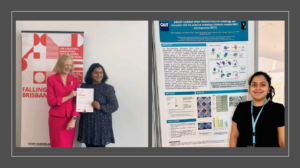 Image (L to R): Nipuni receiving the People’s choice award at Falling Walls (Brisbane 2022); Nipuni presenting her research at the New Phytologist Next Generation Scientists Symposium (Singapore (2023)
Image (L to R): Nipuni receiving the People’s choice award at Falling Walls (Brisbane 2022); Nipuni presenting her research at the New Phytologist Next Generation Scientists Symposium (Singapore (2023)
Beyond her research, Nipuni is passionate about teaching and mentoring the next generation of scientists. She is currently co-supervising two PhD students and has delivered some plant biology lectures in plant biology courses at QUT. During her PhD, she served as the lead tutor for three biology course units. Her dedication to education is reflected in outstanding student feedback, and her enthusiasm for mentoring is evident through her continued efforts to share knowledge and expertise. Her academic journey was recently featured in Careers with STEM magazine. Nipuni was a member of the ASPS organizing committee in 2023 and is now chairing the upcoming ASPS QLD Node Conference in November 2024. As the Genetics and Molecular Biology Representative for ASPS, she is excited to promote plant molecular biology and biotechnology research both in Australia and globally, believing that ASPS provides an excellent platform for advancing this mission.
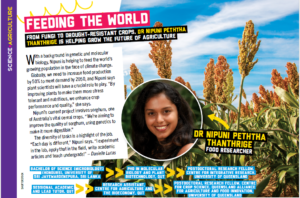
Image: Careers with STEM magazine
Student Contribution
 Benjamin Wee Yang
Benjamin Wee Yang
PhD candidate, ARC Industrial Transformation Research Hub for Medicinal Agriculture, La Trobe Institute for Sustainable Agriculture & Food (LISAF – AgriBio research center), Department of Animal, Plant and Soil Sciences, School of Agriculture, Biomedicine and Environment, La Trobe University
Benjamin Wee Yang Profile | La Trobe University | Linkedin
With extensive experience in the horticultural industry, Benjamin is now in the final year of his PhD at La Trobe University. “My professional background in horticulture has shaped my focus on delivering practical research outcomes for the growers, particularly for high-value crops like medicinal plants. There’s a significant opportunity to influence cultivation practices towards more sustainable targets, given the relative infancy of the industry” he explains.
“Following my time in industry, I found the ideal opportunity with the ARC Medicinal Agriculture Hub, based at AgriBio, La Trobe University—a leading centre for agricultural biosciences. And after these three years, I can honestly say it’s been one of the best decisions I’ve made. The Hub brings together a wealth of expertise, and the leadership has been incredibly supportive in helping us achieve our research goals. Being part of the Phenotyping and Cultivation team has also added an invaluable interdisciplinary dimension to my work, under the excellent guidance of Dr Oliver Berkowitz and Dr Ricarda Jost, respectively.”
Benjamin’s PhD research focuses on nutrient use in hemp and drug type Cannabis sativa. “By integrating physiological, metabolomic and transcriptomic data from a carefully controlled study system, my objective is to identify key markers for efficient nutrient use in this multi-purpose crop,” he says. His research aims to provide actionable insights that will promote more sustainable agricultural practices and enhance crop performance in commercial production systems. Read his latest peer reviewed article on the subject HERE
Acknowledgements: The work was funded by the ARC ITRH for Medicinal Agriculture (IH180100006) and involved the industry partners Photon Systems Instruments and Cann Group.
Student travel grant awardees report – IBMP Cairns 2024
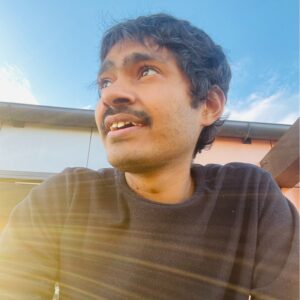 Happy Singh – UWS (NSW)
Happy Singh – UWS (NSW)
LinkedIn: Happy Singh
I, Happy, PhD candidate at Hawkesbury Institute of the Environment of Western Sydney University (Australia) thrilled to share my wonderful experience at the International Plant Molecular Biology Conference (2024) held in Cairns this year. First and foremost, I would like to extend my gratitude to the IPMB committee for giving me the opportunity to present a portion of my research and for selecting me for the Travel Grant Award. It was an incredible experience to learn about the groundbreaking work being conducted by renowned researchers and scientists in their respective fields. I presented a poster on my PhD work titled “Cellular Vibration by Sound Waves Disrupts Poricidal Cone Trichomes to Boost Tomato Pollination, Seed Set, and Fruit Size.” I had the opportunity to interact with numerous researchers and scientists, engaging in discussions to understand the significance of sound waves in agriculture. Additionally, I received valuable suggestions to improve the quality of my research. Overall, presenting my poster at IPMB was a great experience, and I learned a lot about how the scientific community operates. The plenary sessions were particularly outstanding, both at the beginning and the end of the conference, showcasing the meticulous effort put in by the organizing committee. It was also a fantastic opportunity to connect with students and researchers from all over the world, sharing diverse scientific perspectives and areas of interest. Overall, it was an incredible experience to be part of such a remarkable conference.
Zuba Ahmed – QUT (QLD)
LinkedIn: Zuba Ahmed
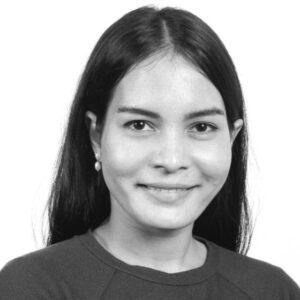 Attending the IPMB 2024 conference in Cairns was a wonderful experience. I was able to build my network and learn about the exciting advances in plant science from around the world. It was my first time presenting my research at an international conference, and I am thankful for ASPS for providing travel funding to attend. The conference program was diverse with many opportunities to connect with other PhD students and researchers. I especially enjoyed the plenary speaker sessions held throughout the conference and the invited speakers were a great source of motivation for my own work and career development.
Attending the IPMB 2024 conference in Cairns was a wonderful experience. I was able to build my network and learn about the exciting advances in plant science from around the world. It was my first time presenting my research at an international conference, and I am thankful for ASPS for providing travel funding to attend. The conference program was diverse with many opportunities to connect with other PhD students and researchers. I especially enjoyed the plenary speaker sessions held throughout the conference and the invited speakers were a great source of motivation for my own work and career development.
Editor’s note: Zuba worked with an indigenous artist to create a Nicotiana benthamiana t-shirt based on her research
Khaksefidi Reyhaneh – Uoa (SA)
Bio: Researcher Profile – The University of Adelaide | LinkedIn: Khaksefidi Reyhaneh
Receiving the IPMB travel award from the Australian Society of Plant Scientists was a significant honour, and I thoroughly enjoyed the conference both scientifically and socially. This award enabled me to attend the 13th International Congress on Plant Molecular Biology held in Cairns. Attending this conference in Australia was a highlight of my PhD journey as I had the opportunity to network with researchers from around the world. The sessions were incredibly informative, offering insights into the latest research and developments in plant science. I had the chance to present my poster titled ‘Exploring MicroRNA-Mediated Regulation in Barley Inflorescence Development,’ which received valuable feedback from peers and experts in the field. Attending sessions expanded my knowledge and inspired new ideas for my future research. Overall, the conference was a remarkable experience, and I am grateful to ASPS for making it possible.
Editors’ note
Phytogen will be back for our next issue in mid-November, JUST before the 2024 conference happens. Don’t forget to register!
Stay spooky, green thumbs

